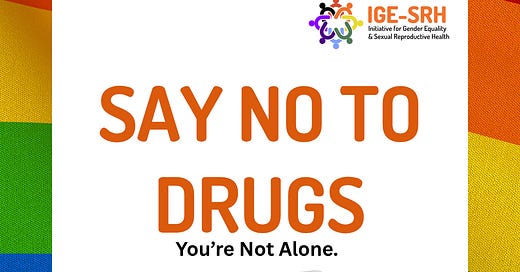We Don’t Talk About This Enough.
A hard conversation on drug abuse in queer spaces, and the healing we deserve.
I remember the first time I realized something was wrong.
It wasn’t the loud kind of wrong. It was the kind that creeps up in the middle of a house party when someone you love is laughing too hard, moving too fast, their eyes glassy with something they swore they’d stopped using. No one said anything. We didn’t want to ruin the vibe.
We don't talk about drug abuse in the queer community enough, at least not with the seriousness and tenderness it deserves.
And yet, it’s everywhere.
A Hidden Epidemic
Queer folks are disproportionately affected by substance abuse. It’s not because we're weak or reckless. It’s because the world is often unkind, and for many, substances become a way to cope with rejection, violence, homelessness, and the weight of living in a society that tells us we’re too much and not enough at the same time.
In queer spaces, parties can become both sanctuary and escape. The line between celebration and survival blurs. Sometimes, so do our boundaries.
We celebrate Pride but avoid asking what happens after the music fades, when someone’s left picking up the pieces of a night that went too far.
Why It Happens
Substance abuse in our community isn’t just about individual choices. It's structural:
Stigma and mental health: Constant discrimination, internalized shame, and untreated trauma all increase vulnerability to substance use.
Lack of affirming healthcare: Many queer people fear seeking help due to past mistreatment by doctors or therapists.
Social norms in queer nightlife: Drug use is often normalized in queer social settings, especially for trans women, trans men, and queer youth.
Isolation: For many, the community is the only family they have. When that family is also struggling, it becomes harder to see what’s unhealthy.
What We Can Do
Curbing drug abuse isn’t about judgment. It’s about care. And it starts with community.
Here are some ways we can begin:
1. Talk About It. Openly.
We can’t heal what we don’t name. Let’s create spaces where we can talk about substance use honestly, without shame, without whispering, without waiting until it’s too late.
2. Support Harm Reduction.
Abstinence isn’t the only way. Organizations that provide clean needles, safe use kits, overdose reversal training, and non-judgmental care are lifesaving. We should support and fund them.
3. Create Alternatives.
Not all queer joy needs to be soaked in alcohol or drugs. We need sober spaces. Healing circles. Art nights. Movement-based joy. Let's imagine more.
4. Push for Queer-Affirming Mental Health Care.
We need more therapists, counselors, and support groups that are trauma-informed and understand the unique pressures of queer life in Nigeria (and beyond). Mental health is prevention.
5. Show Up for Each Other.
Sometimes, someone doesn’t need a lecture, they need someone who’ll pick up the phone. Who’ll sit with them. Who won’t walk away.
A Personal Note
If you’re struggling: you are not alone. You’re not broken. You’re not beyond help. You’re here, and that means something.
If someone you love is struggling: don’t give up on them. Don’t ignore the signs. Ask the hard questions. And hold space for the answers.
This is a community issue. Which means it will take all of us to heal.
We don’t talk about this enough.
But today, we are.
And that’s a start.
Once more, Happy Pride Month.
From your Favourite Queer Fairy,
Tori.





